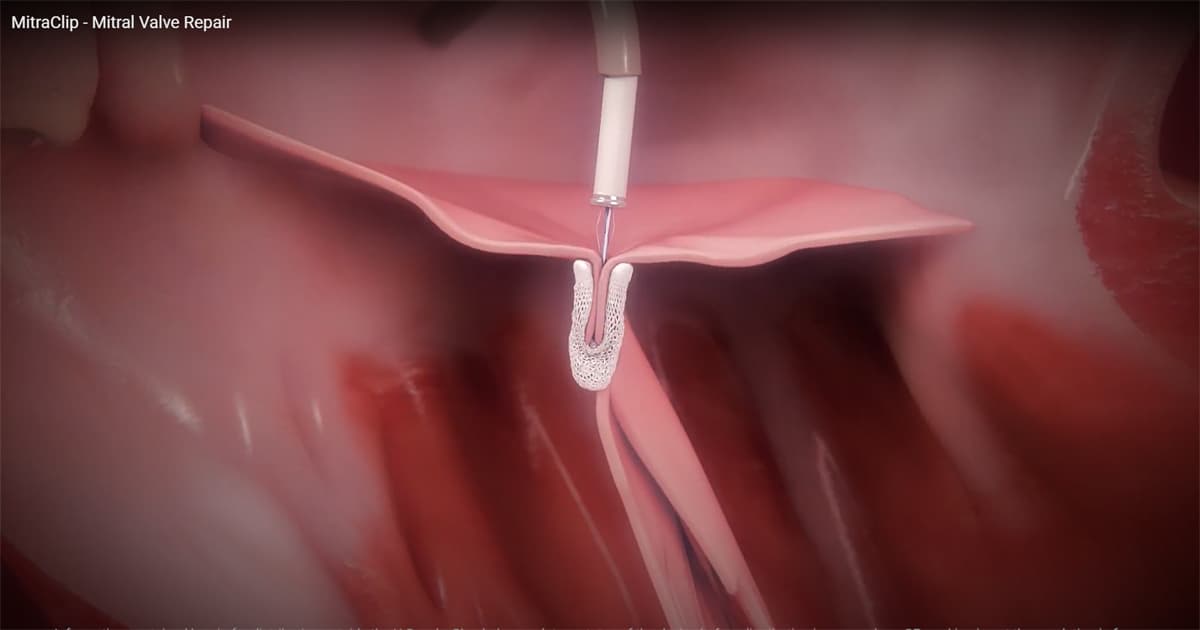Mitraclip Surgery | Hong Kong Asia Heart Centre
Mitral regurgitation (or “MR”) is a condition affecting one of the valves in your heart, the mitral valve. The valves in your heart control the flow of blood through the four chambers of your heart. Each heart valve is made up of thin, but strong flaps of tissue. As blood flows through the four chambers of the heart, the valves open and close to ensure that blood flows in the right direction.
The mitral valve is located between your
heart’s two left chambers and allows blood to flow forward through your heart
during a normal heart- beat. When the mitral valve fails to close completely,
blood flows backward in the opposite direction. This backward flow is called
mitral regurgitation.
Cause:
There are several causes of mitral regurgitation. These include:
- Heart disease (such as heart failure), or other conditions that causing heart valve annulus dilatation
- Deterioration of heart tissue leading to valve prolapse
- Congenital heart valve abnormalities` (abnormal at birth)
- Rheumatic Heart Disease
- Degenerative change due to aging
Symptom:
In order to compensate the effect of mitral / tricuspid regurgitation, the ventricles would increase its pumping action to maintain enough blood supply to our body. Heart muscle would then be overloaded and becomes enlarged in size and weak. This extra burden on the heart and lungs may lead to heart failure in the long run. There would be insufficient blood supply for the body requirement, and may eventually lead to arrhythmia (irregular heartbeat), stroke, and even sudden death.
Patients with mitral / tricuspid regurgitation might not experience symptoms, or some may have:
- Tiredness and weakness
- Shortness of breath (dyspnea), especially on exertion (vigorous movement) or while lying down
- Cough (especially at night or when lying down)
- Lower Limb edema (swelling)
- Poor appetite
- Arrhythmia
- Palpitation (feeling of rapid heartbeat)
The MitraClip procedure:
A MitraClip procedure is carried out under
a general anaesthesia in catheterization laboratory with assistance of
trans-esophageal echocardiography (TEE) and X-rays. During the procedure,
doctors access the mitral valve with a thin tube (called a catheter) that is
guided through a vein in patient’s leg to reach the heart. The MitraClip is
then clipped to the mitral valve and help it close completely. A procedure
usually takes three to four hours on average but it can vary due to different
anatomies. The length of hospital stay is around one to five days following the
procedure.
MitraClip surgery risks and postoperative
instructions:
- The MitraClip is approved by the U.S. Food and Drug Administration (FDA) and has been used with more than 80,000 patients worldwide.
- Your doctor will discuss how the risks of MitraClip therapy compare with other options that may be available to you.
- The length of hospital stay is around one to five days following the procedure.
- The MitraClip device is very small–less than the size of a typical fingertip. You will not be able to feel its presence.
- Your doctor may also prescribe a blood thinner after you have received the treatment. It is very important to carefully follow your doctor’s instructions regarding any medicines you need to take.
- Most patients who undergo MitraClip therapy do not need special assistance at home after the procedure, outside of ongoing needs for any unrelated health conditions.
Mitral regurgitation (or “MR”) is a condition affecting one of the valves in your heart, the mitral valve. The valves in your heart control the flow of blood through the four chambers of your heart. Each heart valve is made up of thin, but strong flaps of tissue. As blood flows through the four chambers of the heart, the valves open and close to ensure that blood flows in the right direction.
The mitral valve is located between your
heart’s two left chambers and allows blood to flow forward through your heart
during a normal heart- beat. When the mitral valve fails to close completely,
blood flows backward in the opposite direction. This backward flow is called
mitral regurgitation.
Cause:
There are several causes of mitral regurgitation. These include:
- Heart disease (such as heart failure), or other conditions that causing heart valve annulus dilatation
- Deterioration of heart tissue leading to valve prolapse
- Congenital heart valve abnormalities` (abnormal at birth)
- Rheumatic Heart Disease
- Degenerative change due to aging
Symptom:
In order to compensate the effect of mitral / tricuspid regurgitation, the ventricles would increase its pumping action to maintain enough blood supply to our body. Heart muscle would then be overloaded and becomes enlarged in size and weak. This extra burden on the heart and lungs may lead to heart failure in the long run. There would be insufficient blood supply for the body requirement, and may eventually lead to arrhythmia (irregular heartbeat), stroke, and even sudden death.
Patients with mitral / tricuspid regurgitation might not experience symptoms, or some may have:
- Tiredness and weakness
- Shortness of breath (dyspnea), especially on exertion (vigorous movement) or while lying down
- Cough (especially at night or when lying down)
- Lower Limb edema (swelling)
- Poor appetite
- Arrhythmia
- Palpitation (feeling of rapid heartbeat)
The MitraClip procedure:
A MitraClip procedure is carried out under
a general anaesthesia in catheterization laboratory with assistance of
trans-esophageal echocardiography (TEE) and X-rays. During the procedure,
doctors access the mitral valve with a thin tube (called a catheter) that is
guided through a vein in patient’s leg to reach the heart. The MitraClip is
then clipped to the mitral valve and help it close completely. A procedure
usually takes three to four hours on average but it can vary due to different
anatomies. The length of hospital stay is around one to five days following the
procedure.
MitraClip surgery risks and postoperative
instructions:
- The MitraClip is approved by the U.S. Food and Drug Administration (FDA) and has been used with more than 80,000 patients worldwide.
- Your doctor will discuss how the risks of MitraClip therapy compare with other options that may be available to you.
- The length of hospital stay is around one to five days following the procedure.
- The MitraClip device is very small–less than the size of a typical fingertip. You will not be able to feel its presence.
- Your doctor may also prescribe a blood thinner after you have received the treatment. It is very important to carefully follow your doctor’s instructions regarding any medicines you need to take.
- Most patients who undergo MitraClip therapy do not need special assistance at home after the procedure, outside of ongoing needs for any unrelated health conditions.


